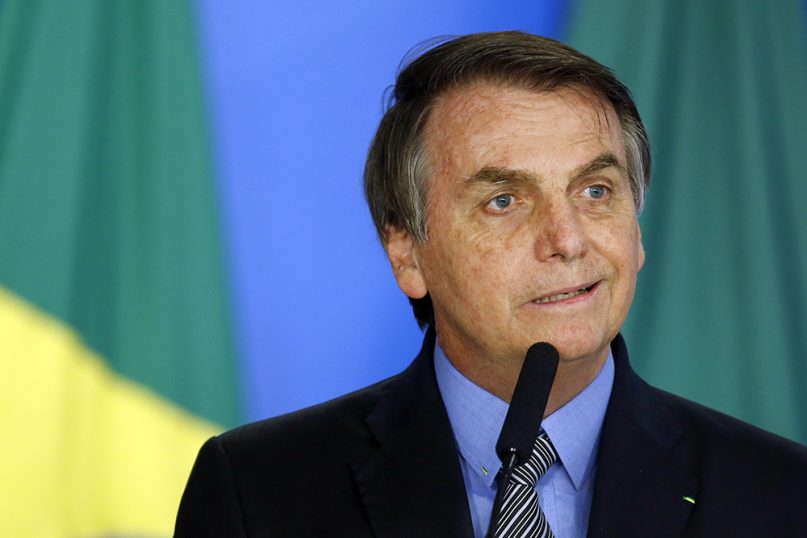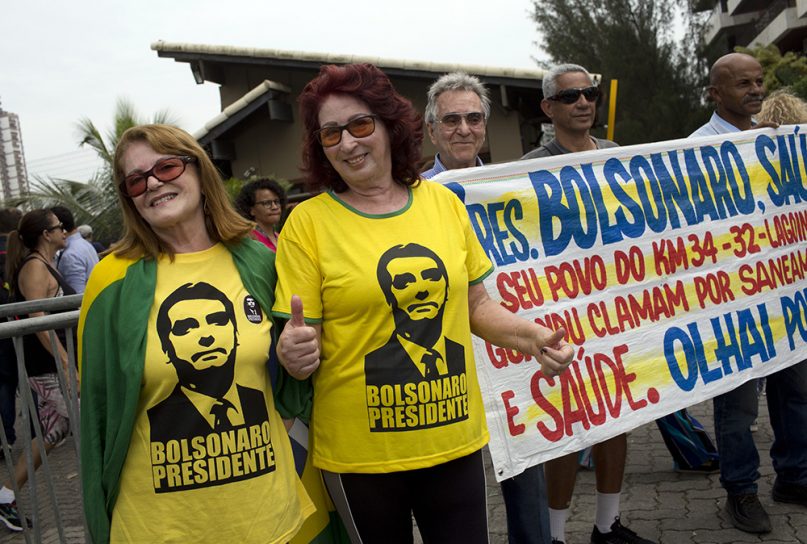
Brazilian President Jair Bolsonaro speaks at a ceremony to kick off the Economic Freedom Project, at the Planalto Palace, in Brasilia, Brazil, on Sept. 20, 2019. (AP Photo/Eraldo Peres)
SÃO PAULO (RNS) — While the most vocal opponents of the Catholic Church’s upcoming Amazon synod have been conservative Catholic cardinals such as the Germans Gerhard Mueller and Walter Brandmueller, criticism within Brazil has come primarily from its right-wing president, Jair Bolsonaro, and his political allies.
Now those political forces have joined with conservative religious leaders, particularly a newly revived group of Catholic conservatives, to oppose the synod before it has begun.
In the months before the Synod of Bishops for the Pan-Amazon Region, which begins officially Sunday (Oct. 6) in Rome, two factions in Brazil have risen up to oppose it: the military and a gaggle of climate change deniers in Congress and the right-wing media.
Members of the armed forces have repeatedly criticized what they see as the Vatican’s meddling in Brazilian affairs. In February, former Gen. Augusto Heleno, who now oversees national and personal security issues for Bolsonaro, said the country’s intelligence agency was monitoring the working documents of the synod.
In September, Gen. Eduardo Villas Bôas, a former commander in chief of the army and now an adviser to Heleno, told the Brazilian newspaper O Estado de São Paulo that the government “would not admit interference in domestic matters of our country.”
Villas Bôas also said the debates surrounding the synod will be “distorted by environmentalists” and said he worried that Brazil’s image would be tarnished by the meeting.
Conservatives’ concerns were seemingly borne out when wildfires broke out in the Amazon in August and the devastation was blamed on large landowners in the Amazon region, many of whom support Bolsonaro. The National Conference of Bishops of Brazil released a statement during the crisis that criticized government policies that, the bishops said, “led to a surge in devastation of the environment” in the country.
“When the church adopts this environmentalist attitude, it’s really adopting the leftist agenda,” said Ricardo da Costa, a history professor at the Federal University of Espírito Santo who advises Bolsonaro’s education agency. “The clergy should worry about saving people’s souls, not saving trees.”
In recent months, however, the intellectual rationale for opposing the synod has been provided by an organization called the Plinio Corrêa de Oliveira Institute, or IPCO. Made up of the remnants of an ultraconservative Catholic group founded in the early 1960s by Brazilian lawyer and thinker Plinio Corrêa de Oliveira, its members have long denounced Catholics who favor abortion rights, left-wing social movements infiltrating the church and progressivism in general.

Plinio Corrêa de Oliveira. Photo courtesy of Creative Commons
When Oliveira died in 1995, the group, originally called the Society for the Defense of Tradition, Family and Property, fell into legal wrangling and his acolytes were forced to choose a new name. But its work against “revolutionary changes” in society and in the church never stopped, and with the rise of a renewed far right wing in Brazil since Bolsonaro’s election, IPCO seems to have gained momentum.
On Saturday, the day before the synod begins, IPCO is holding an alternative meeting in Rome featuring theologians, a climatogist who denies climate change is caused by humans and even an indigenous Amazonian leader. “Our campaign won’t stop. We’ll wait for the synod’s final document,” said Nelson Barretto, a journalist and IPCO activist.
IPCO’s main platform is a website called Pan-Amazon Synod Watch, published in four languages, which aggregates theological and ideological analysis of the issues taken up by the synod, as well as news articles about the church and excerpts from Oliveira’s books.
In an interview earlier this year, Bolsonaro mentioned “Environmentalist Psychosis,” a book written by Bertrand of Orleans-Braganza, a member of Brazil’s erstwhile nobility and a longtime member of IPCO. The book builds on climate change denial views.
“There’s a political alliance between the IPCO and other conservative forces in Brazil at this point,” said João Décio Passos, a professor of religion sciences at the Pontifical Catholic University of São Paulo.
For the institute, the synod is an “neo-communist project” invented by leftist Catholics who want to replace Western values with a “tribalist model,” according to an IPCO article. “The tribal life (without tradition, without family and without property) would be the ideal for the whole society,” the article said.
“IPCO was the first one to raise those concerns throughout the years and now many segments of the government agree with them,” said Barretto. “It’s hard to know which ideas we provided to congressmen and the government. But we certainly gave them several elements (of thought),” he explained.

Supporters of Jair Bolsonaro wear T-shirts with his image while rallying outside Bolsonaro’s home in Rio de Janeiro on Nov. 1, 2018. Bolsonaro took office as president on Jan. 1, 2019. (AP Photo/Silvia Izquierdo)
Left out in the cold in this new Catholic battle are Bolsonaro’s evangelical Christian allies. Though they identify ideologically with Bolsonaro and his military advisers and tend to parrot the administration’s criticisms of environmentalists, they have kept largely silent about the synod itself.
The evangelical churches have experienced tremendous growth in the Amazon region in the past few decades, where, Catholic or not, a significant part of the population reveres Pope Francis.
“Many evangelicals still identify with the pope and he is the emblematic figure of the synod,” explained Francisco Borba Ribeiro Neto, coordinator of the Center of Faith and Culture at the Pontifical Catholic University of São Paulo. “Openly opposing the synod would needlessly risk their position.”
The president’s conservative Catholic friends are not bothered, meanwhile, by Bolsonaro’s closeness with the rapidly growing evangelical Christian denominations. (He’s Catholic, but his wife is evangelical and the majority of Christian churches supported him in his election.) Indeed, IPCO’s Barretto even lays the defection of Catholics to evangelicalism at the church’s feet.
“We are Catholics, but we work together with other Christians during campaigns, when we have points in common. With the ‘leftization’ of the church, conservative Christians moved to evangelicalism. We make coalitions with them,” he said.







